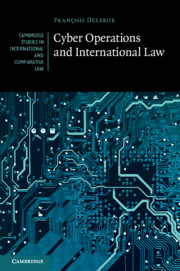Book contents
- Cyber Operations and International Law
- Cambridge Studies in International and Comparative Law: 146
- Cyber Operations and International Law
- Copyright page
- Contents
- Abbreviations
- 1 Does International Law Matter in Cyberspace?
- Part I Attribution
- Part II The Lawfulness of Cyber Operations
- 5 Internationally Wrongful Cyber Acts: Cyber Operations Breaching Norms of International Law
- 6 The Threshold of Cyber Warfare: from Use of Cyber Force to Cyber Armed Attack
- 7 Circumstances Precluding or Attenuating the Wrongfulness of Unlawful Cyber Operations
- 8 Cyber Operations and the Principle of Due Diligence
- Part II – Conclusion
- Part III Remedies against State-Sponsored Cyber Operations
- 11 Conclusion
- Appendix Table Assessing the Lawfulness of Cyber Operations and Potential Responses
- Select Bibliography
- Index
- Cambridge Studies in International and Comparative Law
7 - Circumstances Precluding or Attenuating the Wrongfulness of Unlawful Cyber Operations
from Part II - The Lawfulness of Cyber Operations
Published online by Cambridge University Press: 28 February 2020
- Cyber Operations and International Law
- Cambridge Studies in International and Comparative Law: 146
- Cyber Operations and International Law
- Copyright page
- Contents
- Abbreviations
- 1 Does International Law Matter in Cyberspace?
- Part I Attribution
- Part II The Lawfulness of Cyber Operations
- 5 Internationally Wrongful Cyber Acts: Cyber Operations Breaching Norms of International Law
- 6 The Threshold of Cyber Warfare: from Use of Cyber Force to Cyber Armed Attack
- 7 Circumstances Precluding or Attenuating the Wrongfulness of Unlawful Cyber Operations
- 8 Cyber Operations and the Principle of Due Diligence
- Part II – Conclusion
- Part III Remedies against State-Sponsored Cyber Operations
- 11 Conclusion
- Appendix Table Assessing the Lawfulness of Cyber Operations and Potential Responses
- Select Bibliography
- Index
- Cambridge Studies in International and Comparative Law
Summary
The wrongfulness of a cyber operation, which would otherwise constitute a breach of an international obligation of the responsible State, can be precluded if perpetrated in some specific circumstances. Such circumstances do not terminate or annul the international obligation, but justify or excuse the specific conduct. This chapter analyses the main circumstances precluding wrongfulness on the basis of the work of the International Law Commission. Hence, it focuses on consent, force majeure, distress and necessity. Force majeure, distress and necessity characterise situations in which a State is compelled to commit an act not compatible with its international obligations. The difference between force majeure and distress or necessity is the absence of the element of free choice in the former; while in case of distress or necessity, the State benefits from a certain degree of choice. Cyber operations conducted as a form of reprisal, either in self-defence or as countermeasures, will be dealt with in the last part of this book.
Keywords
- Type
- Chapter
- Information
- Cyber Operations and International Law , pp. 343 - 352Publisher: Cambridge University PressPrint publication year: 2020

